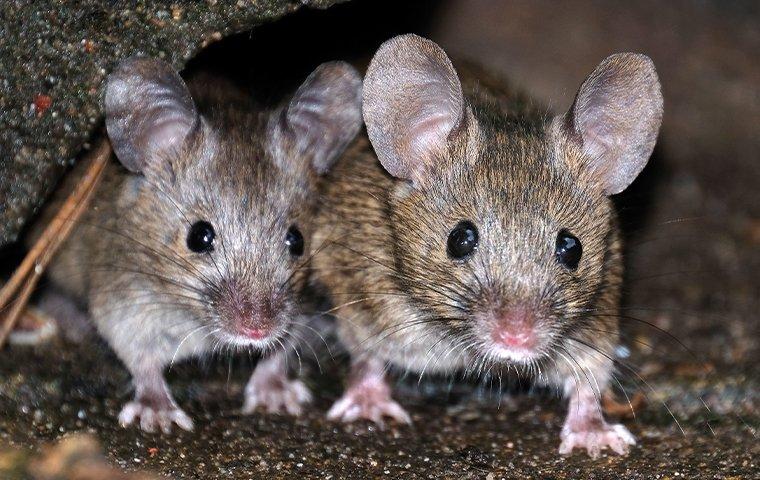
Rodents

What are rodents?
Mice and rats are the two most common rodent species to invade yards, homes, and businesses in Northeast Ohio. While similar, they are two different species with some major differences that help tell them apart. Adult mice are smaller than adult rats. Mice have small, oval-shaped bodies, large ears that sit up off their head, pointed faces, and long, thin tails. Rats have large, elongated bodies with blunter faces, small ears, and scaly, thick tails. If rodents have discovered a way into your home, the most likely culprits are house mice, field mice, or Norway rats.
Our Rodent FAQs
Have questions? We are here to help. Still have questions or can't find the answer you need? Give us a call at 330-278-8939 today!
-
Are rodents dangerous?
Rodents are prey animals, and by nature, they are shy and reclusive, so while you typically don’t have to worry about a rodent attacking you, they are still considered dangerous. Rodents carry and transmit many bacteria and diseases, and disease-carrying ticks and fleas love to live on their backs. They leave behind contaminating trails of urine and excrement, and they leave shed fur wherever they travel.
Another huge concern with rodents is their ability to damage our properties. Because they need to keep their constantly growing front teeth worn down, these critters are continually chewing on anything they come across. In our homes, rodents and their chisel-like teeth cause damage to:
- Wires
- Pipes
- Cables
- Drywall
- Flooring
- Furniture
- Boxes
- Clothing and other personal items
-
Why do I have a rodent problem?
Rodents, over time, have come to rely on people to access their basic needs. They have learned that our indoor and outdoor spaces provide them with food, water, and shelter.
If rodents have decided to call your property home, the following signs should alert you to their presence:
- Holes chewed through food packaging and storage boxes
- Grease marks along baseboards and the bottoms of pieces of furniture.
- Short circuits
- Leaky pipes
- Noises behind walls or above ceilings at night
-
Where will I find rodents?
Rodents are nocturnal pests, so it can often take some time for you to notice their presence. They hide in dark, secluded areas during the day, and at night while we sleep, they emerge to forage for food. If you are seeing mice or rats scurrying across your kitchen floor or in your garden during the day, it is an indicator that the infestation is large.
As the name suggests, house mice are common structural pests in both rural and urban areas. They move into our homes to escape harsh weather, to forage for food, or to nest in a safe location. Some of their favorite nesting spots in our house include behind walls, under floors, in attics, basements, and behind cabinets and appliances.
Field mice are more of an issue in rural areas. Properties near tall grass, fields, meadows, and wooded areas are likely to experience problems with these rodents. Common nesting spots in yards for field mice include under woodpiles, brush piles, fallen trees, and in areas of yard clutter or dense vegetation.
Norway rats nest in fields, farmlands, along riverbanks, and under concrete slabs and foundations. Norway rats aren’t good at climbing, so inside, they typically nest in basements and behind ground floor walls.
-
How do I get rid of rodents?At Epcon Lane, we are proud to professional rodent control for Northeast Ohio homes and businesses. For more than 75 years, we have dedicated ourselves to helping people maintain pest-free properties. Eco-friendly services, excellent customer service, and a satisfaction guarantee are just some of the reasons why so many choose Epcon Lane to take care of their pest control needs! Let our family-owned company protect your family from rodents. To learn more about our pest control packages, give us a call today!
-
How can I prevent rodents in the future?
Eliminate rodents and take back your home with the help of Epcon Lane and by implementing the following rat and mouse prevention tips.
- Clean up the clutter in your yard where rodents can hide or nest.
- Repair entry points leading into your home by sealing spaces around pipes and utilities using steel wool or caulk.
- Place weatherstripping around windows and doors and door sweeps on exterior doors.
- Eliminate overgrown tree branches, shrubs, and other landscaping that can provide rodents with easy access to your house.
- Reduce their access to food by keeping lids on trash cans, recycling bins, and compost bins.
- Keep your kitchen and outdoor eating areas free of crumbs, spills, and other food debris.
Learn more about our home pest control and commercial pest control solutions.